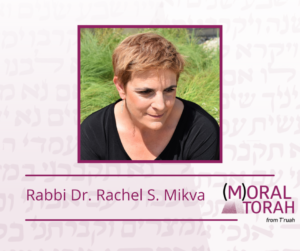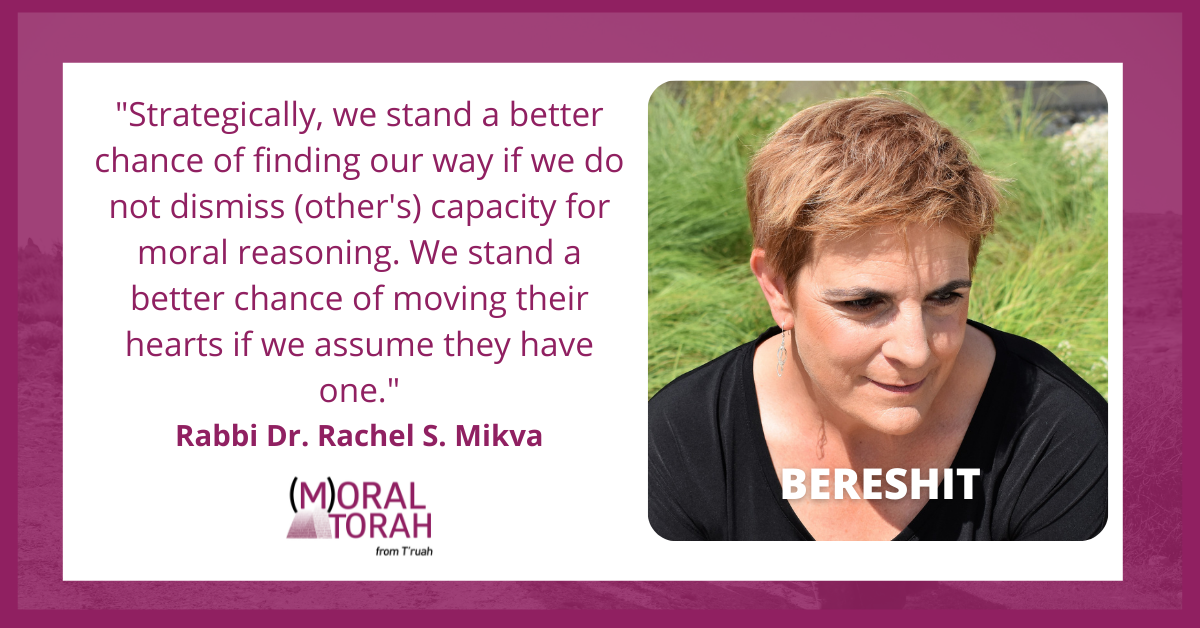A D’var Torah for Parshat Bereshit by Rabbi Dr. Rachel S. Mikva
We live amidst a pandemic of polarization. Highly contagious, the tendency to write off the moral capacity of people who think differently than us is destroying our social fabric.
Political difference has become the barrier we find most difficult to navigate. Twentieth-century Lutheran theologian Paul Tillich had imagined that religious or spiritual convictions defined our “ultimate concern,” but political ideology now seems to occupy that place. We would never assume that someone of another religion is morally bankrupt — but someone who disagrees with our politics is often viewed as a monster.
What does this have to do with Parshat Bereshit? Ferreting out a difficulty in Genesis 2, Maimonides wondered why God wouldn’t want human beings to eat from the tree of knowledge of good and evil. What about the potential benefit, providing the necessary understanding to make moral choices?
Sign up to receive (M)oral Torah in your inbox each week.
Rambam suggested that we had a superior type of knowledge before eating from the tree — knowledge of truth and falsity. Violating the divine command and eating from the tree of knowledge of good and evil diluted this capacity with relative judgments. They are uncertainly grounded in personal feelings about right and wrong, contingent upon culture and context. When we say that the earth is spherical, we understand it to be true; we would not describe it as good. Similarly, “the earth is flat” is false rather than bad. (Guide for the Perplexed I:2) Imagine that everything we think we know could be verified through a shared search for knowledge.
If we could reason and feel our way from common truths, we might come to agreement or compromise on collective action. Unfortunately, these days our beliefs about right and wrong have become so dominant that they determine even the things we acknowledge to be factual.
You would think that questions of human rights would be exempt from this division. How can such things be up for debate? Where I see human rights issues around reproductive justice, however, my neighbor sees human rights violations of the “unborn.” While I want to protect the human rights of Palestinians and revoke 501c3 status for U.S. organizations that support Jewish terrorism in Israel, my landsmann believes he is protecting the Jewish people against annihilation. Immigration, mass incarceration, race, poverty — all have human rights implications, but people do not necessarily agree on what they are.
I struggle against the cynicism that suspects my adversaries simply have no capacity to see beyond their self-interest, or no empathy for people whose lives may be very different than their own. I wrestle with how to fight for my values in the world with clarity and passion — without the sense of absolute truth that renders the opposition as evil.
Find more commentaries on Bereshit.
Of late, I have been trying to figure out what we can learn from people who see the issues so differently from us. Ben Zoma taught that the wise person learns something from everyone (Pirkei Avot 4:1). The sages lifted up the debates of Hillel and Shammai as an argument that was for the sake of Heaven, the only kind that can bear fruit (Pirkei Avot 5:17). Many things may make their example worthy of mention; the fact that they took each other’s arguments seriously is among them.
Strategically, we stand a better chance of finding our way if we do not dismiss their capacity for moral reasoning. We stand a better chance of moving their hearts if we assume they have one.
 As we conclude the fall harvest festival of Sukkot in this year of shmitah, a year of sabbatical “release,” I am going to let go of the scorn I harbor for those who fight on the other side. I am going to let go of my certainty without forfeiting my commitment. Or at least I will try, and hope that it bears fruit.
As we conclude the fall harvest festival of Sukkot in this year of shmitah, a year of sabbatical “release,” I am going to let go of the scorn I harbor for those who fight on the other side. I am going to let go of my certainty without forfeiting my commitment. Or at least I will try, and hope that it bears fruit.
God, we pray that our words and our deeds may be for Your sake, bringing healing to our world and wholeness to all those whose lives we touch.
Rabbi Dr. Rachel S. Mikva serves as the Herman E. Schaalman Professor in Jewish Studies, Interim Academic Dean, and Senior Faculty Fellow of the InterReligious Institute at Chicago Theological Seminary. Her most recent book is Dangerous Religious Ideas: The Deep Roots of Self-Critical Faith in Judaism, Christianity, and Islam. Follow her on Twitter @RMikva.

